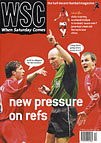 Belarus missed their two best players as Ukraine pipped them for a World Cup play-off spot. Paul Roberts explains why some saw sinister motives at work
Belarus missed their two best players as Ukraine pipped them for a World Cup play-off spot. Paul Roberts explains why some saw sinister motives at work
"It was treachery and disgraceful,” said the Belarus coach Eduard Malofeyev. He was referring to the performance of his two key midfielders, Oleksandr Khatskevich and Valentsin Belkevich, after his team’s 2-0 home defeat in the crucial World Cup qualifier against Ukraine on September 2. Khatskevich was substituted at half-time and Belkevich on the hour. The two players then refused to travel to Wales for the final qualifier (“still ashamed of themselves” according to Malofeyev) which a demoralised and weakened Belarus lost 1-0. This allowed Ukraine to snatch the group five play-off place at the death, thanks to a controversial late goal by Andriy Shevchenko in Poland.
A simple touch of the Newcastles in the home straight by an inexperienced team and an emotional manager? Perhaps. But many people in the region see a more sinister explanation. Malofeyev, an honourable and dedicated lifelong football man who has since resigned from his post, was clearly one of them. He was distraught at what he believed had been done to destroy his impressive work in taking modest Belarus to the brink of qualification for a major tournament for the first time.
The key to his suspicions was that both Khatskevich and Belkevich play for Dynamo Kiev, the powerful Ukrainian champions. Malofeyev made a point of exempting his opposite number, the legendary Dynamo and Ukraine coach Valery Lobanovsky, from criticism. Instead, attention has focused on the shadier characters who dominate the administration of Ukrainian football. The president of the Football Federation of Ukraine is Hryhoriy Surkis, a politician who has business interests across the nation’s economy, ranging from banking, breweries and the media to parts of the former state-owned heavy industry and, most crucially, large chunks of the energy sector. He is also a very hands-on president at Dynamo Kiev, where he is backed up by his ever-present associate in politics, business and football, the deputy speaker of parliament, Viktor Medvedchuk.
The duo learnt quickly after the break-up of the Soviet Union that associating themselves with footballing success offered a unique opportunity to boost their image and counterbalance the damage done by their often very dubious business activities. They moved smartly to rescue Dynamo Kiev from the period of chaos that followed the demise of its state backing and restored it to being a power in European competitions.
The one major hiccup came when Surkis got Dynamo banned from Europe for a season following a misunderstanding over a referee, some fur coats and a bit of over-effusive hospitality. Dynamo’s light has begun to fade over recent seasons. Muttering about money laundering, the missing millions from years of Champions League participation and the whereabouts of the proceeds from the transfers of the likes of Shevchenko, Rebrov, Kakhi Kaladze and Oleg Luzhny is now commonplace among their fans.
Poor Khatskevich and Belkevich could reasonably expect to be next in line to benefit from a transfer overseas. Thus the future wealth and, some would say, health of their families are firmly in the hands of Surkis and Medvedchuk. Hence the concern over their attitude towards Belarus’ final two qualifiers.
Surkis’s attention wandered from Dynamo to the Ukraine national team after the embarrassment of its elimination from Euro 2000 in a farcical play-off defeat by Slovenia. His media and other business interests, which are closely associated with the game in Ukraine via advertising, were suffering terribly because of its serial failure to qualify for anything. Another shambolic campaign trailing in the wake of neighbours Belarus was not part of the plan.
Unlike others of their ilk, both Surkis and Medvedchuk harbour political ambitions beyond retaining the immunity from criminal prosecution provided by their seats in parliament. Football is their only source of national credibility, and with Dynamo on the wane, a World Cup humiliation for Ukraine would not have helped their image one bit. Certainly not with a general election due just before the great jamboree in Japan and Korea.
From WSC 178 December 2001. What was happening this month